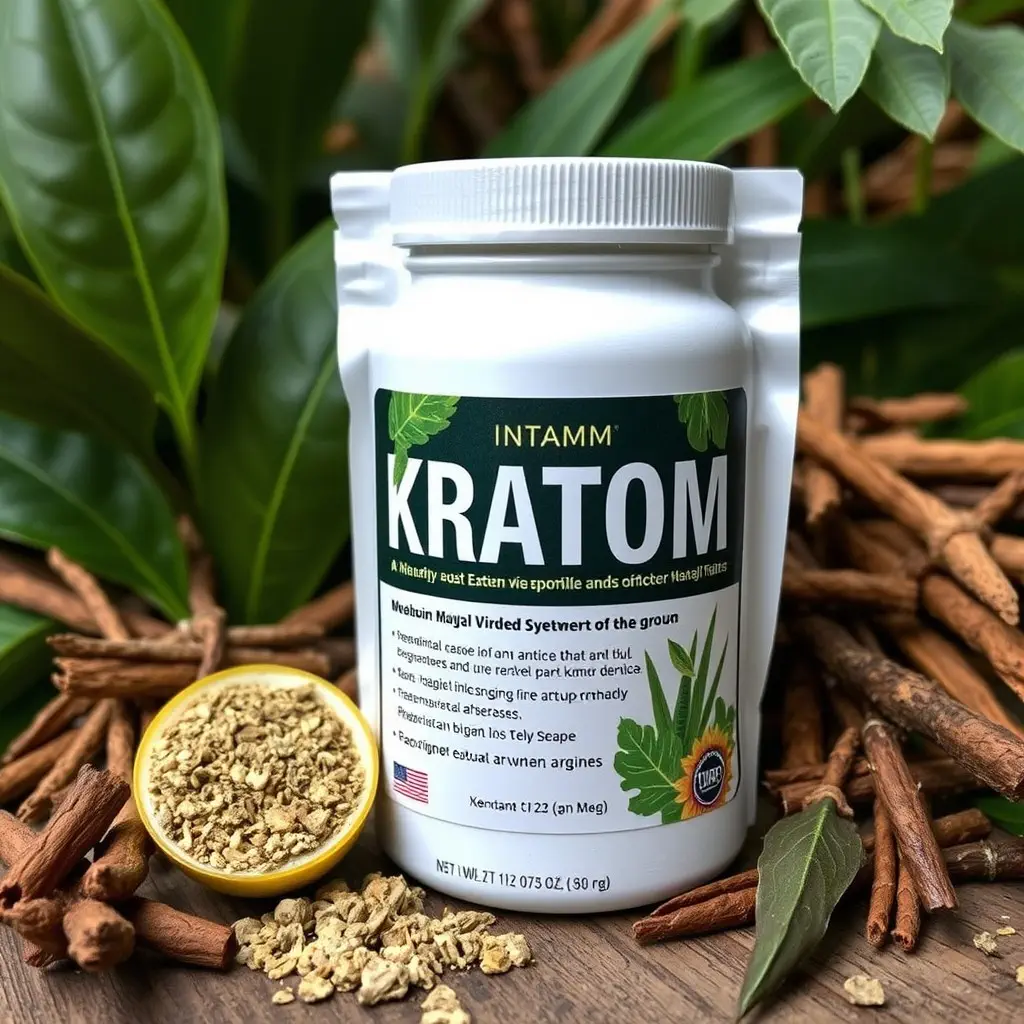Kratom's role in supporting bone health is linked to its rich vitamin and mineral profile, particularly calcium, which is vital for maintaining strong bones, muscles, and cardiovascular function. Since the body stores most of its calcium in the bones, ensuring adequate dietary intake of this mineral is crucial for the dynamic remodeling processes that maximize bone mass in youth and minimize loss in adulthood. Kratom can offer a source of these essential nutrients, but it's important to complement this with a balanced diet to meet daily calcium requirements and facilitate vitamin D absorption, which further supports bone health. The alkaloids in kratom, like mitragynine and 7-hydroxymitragynine, may enhance calcium's benefits by modulating immune responses and reducing inflammation, potentially improving bone density. This synergy with calcium is a key aspect of maintaining optimal bone health, alongside proper diet, adequate vitamin D levels through sunlight or supplementation, regular exercise, especially weight-bearing activities, and medical advice for those considering kratom as part of their nutrition plan. Integrating kratom's nutrient content into a comprehensive approach that includes a well-balanced diet, appropriate supplementation, and healthy lifestyle choices can contribute to robust bone health.
Calcium’s critical role in maintaining bone density is well-established, yet its full potential is often underutilized. This article delves into the intricacies of calcium’s function beyond being a mere vitamin and mineral component within Kratom’s rich spectrum. We explore how Kratom alkaloids can synergize with calcium to bolster bone health, offering insights into a holistic approach for enhancing density. By examining the intersection of dietary intake, natural supplementation, and lifestyle modifications, readers will gain valuable strategies to support strong bones. Join us as we unravel the mysteries of calcium’s impact on bone density with a focus on Kratom’s vitamins and minerals.
- Unlocking Calcium's Role in Bone Density: Beyond Kratom's Vitamin and Mineral Spectrum
- The Synergy of Kratom Alkaloids and Calcium for Optimal Bone Health
- Strategies for Enhancing Bone Density with Calcium, Kratom Nutrients, and Lifestyle Adjustments
Unlocking Calcium's Role in Bone Density: Beyond Kratom's Vitamin and Mineral Spectrum

Calcium is a cornerstone in the maintenance of bone density, a fact well-documented beyond the realms of Kratom’s vitamins and minerals. While Kratom is known to contain a spectrum of essential nutrients, including calcium, its role in optimizing bone health extends beyond this singular aspect. Calcium plays a multifaceted role; it not only contributes to the structural integrity of bones but also facilitates muscle contractions and supports cardiovascular function. The body’s skeletal system houses approximately 99% of the total calcium in the human body, with continuous remodeling processes ensuring both peak bone mass during youth and preventing excessive bone loss later in life. Adequate dietary intake of calcium is crucial for these processes, and while Kratom can contribute to this intake, a balanced diet and supplementation may be necessary to meet the recommended daily amounts. Additionally, Vitamin D, often discussed alongside calcium, is essential for calcium absorption in the gut, making its presence in Kratom, if any, all the more beneficial for bone health. Together, these nutrients support robust bones and a healthy body, emphasizing the importance of considering both dietary sources like Kratom and other food items rich in vitamins and minerals in the holistic approach to maintaining optimal bone density.
The Synergy of Kratom Alkaloids and Calcium for Optimal Bone Health

Kratom, a tropical evergreen tree native to Southeast Asia, has garnered attention for its wide array of alkaloids that may interact synergistically with various nutrients, including calcium, to support optimal bone health. The alkaloids found in kratom, such as mitragynine and 7-hydroxymitragynine, have been studied for their potential effects on the body’s systems, which may indirectly influence bone density. These compounds are known to modulate immune function and inflammation, both of which can affect bone metabolism. When combined with adequate calcium intake, kratom alkaloids might enhance the absorption and retention of calcium in the bones, contributing to their strength and resilience. Calcium is a vital mineral for bone health, as it constitutes a significant portion of bone tissue and is crucial for maintaining bone structure and preventing osteoporosis. The synergy between kratom’s alkaloids and calcium can be particularly beneficial for individuals looking to bolster their skeletal system, especially if they are at risk for or have been diagnosed with conditions affecting bone density. It is important to note that while the potential benefits of this synergy exist, a balanced diet rich in vitamins and minerals, including calcium, remains foundational for maintaining healthy bones. Individuals considering the use of kratom should consult healthcare professionals to ensure safety and efficacy, particularly when combined with other supplements or medications.
Strategies for Enhancing Bone Density with Calcium, Kratom Nutrients, and Lifestyle Adjustments

Calcium is a cornerstone nutrient for maintaining and enhancing bone density, but it’s not the sole element in this biological equation. A multifaceted approach that includes the right dietary intake of minerals like those found in kratom, along with vitamins and lifestyle adjustments, can significantly improve bone health. Kratom, a tropical plant, contains various vitamins and minerals that support bone density; specifically, its alkaloid profile, including compounds such as mitragynine and 7-hydroxymitragynine, may contribute to this process by supporting the body’s natural balance.
Incorporating a diet rich in calcium is essential, with dairy products, leafy greens, and fortified foods being primary sources. Beyond calcium, vitamin D plays a crucial role in calcium absorption, making it imperative to ensure adequate sun exposure or supplementation to maintain optimal levels of this vitamin. Additionally, other minerals like magnesium, zinc, and boron, often available in kratom, contribute to the health of bones and joints. Moreover, engaging in weight-bearing exercises such as walking, jogging, or resistance training can stimulate bone growth and strength. Regular physical activity not only promotes new bone formation but also aids in maintaining muscle mass, which is vital for supporting bones and reducing the risk of falls and fractures. Together, these strategies—calcium-rich diets, kratom’s vitamins and minerals, and lifestyle adjustments—create a comprehensive plan for enhancing bone density and overall skeletal health.
In conclusion, calcium’s pivotal role in maintaining bone density is a critical aspect of overall health that extends beyond mere dietary supplementation. The article has explored how Kratom’s rich vitamin and mineral spectrum, particularly its calcium content, can synergize with other nutrients to support optimal bone health. By integrating targeted dietary choices, such as those provided by Kratom, alongside strategic lifestyle adjustments, individuals can effectively enhance their bone density. It is clear that a comprehensive approach, combining these natural compounds found in Kratom with a balanced diet and regular exercise, forms the foundation for robust bones and a healthy body. As we continue to uncover the myriad benefits of Kratom’s vitamins and minerals, it becomes increasingly evident that they offer more than just potential therapeutic properties; they are key components in our body’s natural mechanisms for building and maintaining strong bones.






